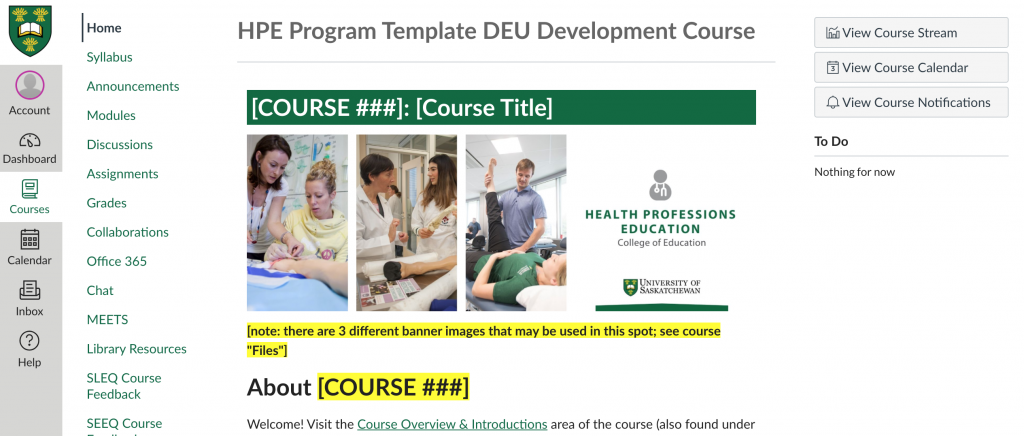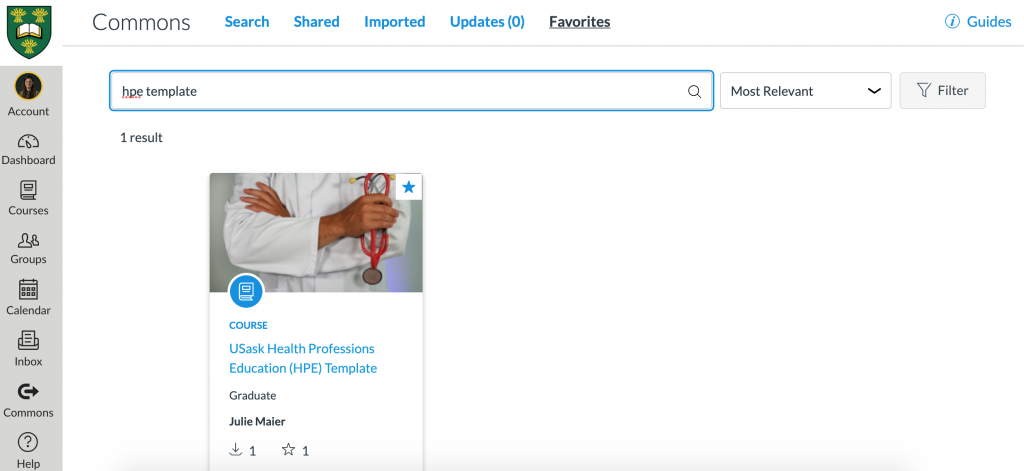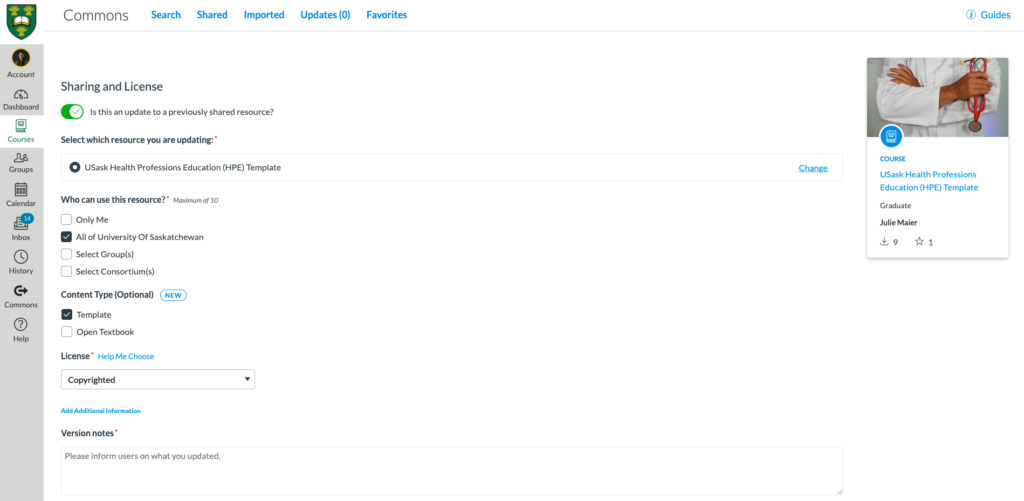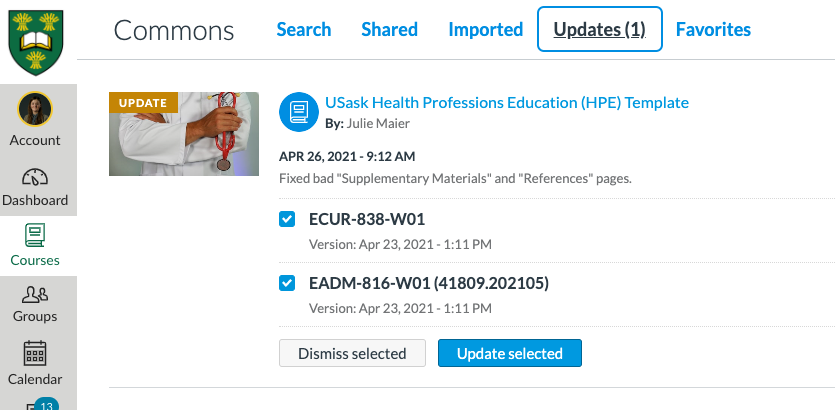Using Canvas Commons to create and distribute a customizable course and module templates can be a great way to support quality online course design, as well as provide a consistent learning experience for students across multiple courses within a program. Many instructors have also made use of the USask Default Canvas Course Template, and since being published to Canvas Commons in August 2020, it has since been downloaded into many hundreds of unique Canvas courses!
Using Canvas Commons to create and share learning resources, including customizable module/course templates, is great. However, we’ve recently learned the hard way to watch out for a weird thing that can happen when Updates are made to Canvas Commons resources. Consider this post a warning, so that you can hopefully avoid the same mistake!
Setting Up The Template
In a previous post entitled Creating a Custom Course Template: A Canvas Commons Case Study, we shared some information about how USask support staff (an instructional designer, specifically) worked with stakeholders in the Health Professions Education program to design a program-specific course template. This template was built in a Canvas “development” course, and then the entire course was shared to Canvas Commons. From there, it could be accessed by HPE instructors through a quick search of Canvas Commons (or by a direct link), imported into their blank courses when they were being initially developed, and customized from there.
Nice! So far this is going great.


A Quick Template Revision
At some point recently, support staff noticed a couple of Pages in the template had some bad information on them (broken links and irrelevant readings). So, we went into the “development” course and cleaned up those issues quickly, and then repeated the steps to share to Canvas Commons; however, this time around Canvas asked “Is this an update to a previously shared resource?” and we confirmed that yes, it was. We also filled in a quick explanation in the “Version notes” field to indicate what I had changed in the template.
All good so far!

Updating the Courses (and What Went Wrong)
We noticed immediately after sharing the revised template that we had an “Updates” notification in the top menu within Canvas Commons. Clicking on it, it showed a list of all of the courses where I had previously imported that template and built upon it. It had a nice button to “Update selected”:

Here’s where we really should have paid closer attention to the Canvas Instructor Guide:
Updating a previously shared course in Commons can replace constituent resources within the dependent course, resetting or replacing important settings, course design, and even resources like assignments. Please use caution when updating courses via Commons.
We went ahead and clicked “Update selected”, assuming it would impact only the 2 Pages I had updated, and would push that change through to the courses indicated. Unfortunately, what this did instead was repeat the import of the entire template!
Essentially, this resulted in a good chunk of those courses (i.e., every course item that had been edited from the version of it first brought over in the template import, including the Home Page, Syllabus, the first Module and all Pages within it, and a handful of Discussions and Assignments) being overwritten with the template version. To the poor instructors, it looked like much of their courses had suddenly reverted back to the template, and also that columns in their Grade Book were no longer adding up correctly. Oh no!!
Fixing the Mess
There is really no simple way to “undo” many actions in Canvas, and an import of a Canvas Commons resource (or in this case, pushing an update through to courses via what is basically a repeat of the full import) is one of those “hard-to-undo” things.
While ICT does save data from Canvas courses, this is done only intermittently (via a test environment that is refreshed monthly, and a beta environment that is refreshed weekly). So while reverting the Canvas course to an earlier version is technically possible with ICT help, they can only revert to these particular moments in time. Furthermore, student data since that time could not be copied over, and I did not want to risk losing any student activity such as Discussions or submitted Assignments. The fix would have to be done “manually”.
How easy this was depended on the item affected:
-
- Pages (including the Home Page): easy to revert. If you look at the page history, you can easily see where the time when the change happened, and revert to the last version before the update.
- Modules: impossible to revert. Once the pages within the module were fixed, you still needed to fix things like text headings and parts of how the module was organized.
- Syllabus: impossible to revert. The Syllabus file stayed in “Course Files” but needed to be re-added to this area of the course.
- Discussions: impossible to revert. Each one that was affected, because it was an edited item that came over in the template, had to be re-built and the settings adjusted back manually.
- Assignments: impossible to revert. Like the Discussions, had to be re-built and the settings adjusted back manually. Settings on the Assignment Groups and their weighting also had to be redone.
- Other things like Groups, Quizzes, Rubrics, and Course Settings could also be affected, and changes to those are impossible to revert.
All in all, the fix in this case took maybe an hour per course. While not a huge amount of time, it certainly caused a bit of stress, and briefly some confusion for the instructors and their students.
How to Avoid This in the Future
A few lessons learned from this mistake:
-
- When making updates to a Canvas Commons resource that has already been imported into multiple courses, consider instead removing the old version from Canvas Commons, and share the revised version as a new, separate resource. (This might break any direct links you have that pointed to the old resource.)
- If you do make an update to an existing resource, communicate with instructors who might see the “Updates” notification in Canvas Commons. It might be best for them to Dismiss those notifications. If updates are minor, editing them directly in each course might be way easier.
- Be careful with the “Updates” notification in Canvas Commons. It might be pushing a lot more changes than you really want!
- If you’re not sure, read the Canvas documentation carefully. 😫


